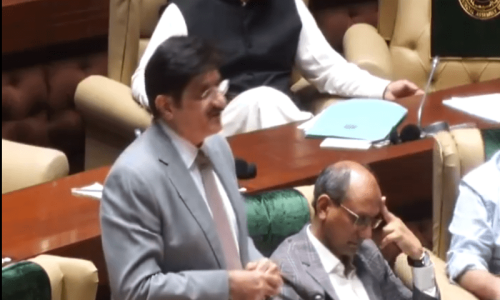KARACHI: Senior Minister for Finance, Planning & Development Syed Murad Ali Shah told the Sindh Assembly on Monday that the Sindh government was faced with a shortfall of Rs70 billion — Rs10 billion in the provincial receipts and Rs60 billion in capital receipts — by the close of the third quarter of the current financial year.
He, however, said he hoped the central receipts shortfall caused for want of collection would be met by the FBR within the next two months and the provincial revenue shortfall would be recovered in the next three months.
Piqued by the Muttahida Qaumi Movement legislator Rauf Siddiqui’s comments on the quarterly report — January to March 2016 — that how much amount the government had allocated and released for the prosecution of the MQM, the minister said the Pakistan Peoples Party government had never indulged in victimisation of rival parties in the past nor would it do so in the future. “But it doesn’t mean either that we let criminals off the hook in the past or will do so in the future,” he said.
The report was earlier laid before the house by senior minister Nisar Khuhro.
The house was called to order at 11.30am by Deputy Speaker Syeda Shehla Raza and was adjourned at 12.40pm for Tuesday to start discussion on the finance department at 10am.
Earlier, MQM parliamentary party leader Syed Sardar Ahmad said that although the legislators had to start discussion on three quarterly reports and on the budget proposals for 2016-17 but as the third quarterly report was laid that day, he suggested the discussion should be initiated from Tuesday so that lawmakers could have enough time go through the report.
The minister agreed to the proposal and highlighted fundamental points of the report, saying the budget estimates from the provincial receipts were Rs726 billion of which Rs494 billion were from the federal government.
During past nine months the province ought to have got Rs370 billion but received Rs310 billion which meant Sindh had received Rs60 billion less from the federal government. He hoped that in next two-three months, the federal government would release the remaining amount.
He said that in the current year’s budget the provincial revenue was estimated at Rs124.6 billion, including Rs61 billion from the GST on services and Rs63.6 billion from other provincial taxes, but till March 31st Rs83.8 billion had been collected against an estimated amount of Rs93 billion, indicating a shortfall of Rs10 billion.
He said the estimated expenditures of the province were Rs503.3 billion in the budget and so far Rs395.3 billion were released during past nine months and Rs285.2 billion were utilized out of the released amounts.
In the ADP of the current fiscal Rs162 billion were allocated including Rs20 billion for the districts ADP and Rs142 for the provincial ADP. Out of Rs142 billion of the provincial ADP so far Rs88.4 billion were released out of which Rs61.4 billion were utilized. Likewise, the minister said that out of districts ADP of Rs 20 billion, Rs12.8 billion had been released.
He asked the lawmakers to consult priority-wise about their ADP schemes with the departments concerned as their proposals would be sent by the finance department to the department concerned.
Syed Sardar Ahmad said that there had come about very positive changes in the budget making but further improvement could be made by reducing difference between the revenue and the expenditure and improving the procedure of utilizing released funds.
Giving an example he said that so far Rs392 billion were released but only Rs285 billion were utilized which meant Rs110 billion remained unutilized. In the education sector, out of Rs115 billion only Rs 82 billion were spent and in the health sector out of Rs49 billion only Rs41 billion were spent, he added.
He called for monitoring the use of funds and reforms in the food department. He said when he used to be chief secretary he had suggested winding up the department which had indebted the government with Rs72 billion and the government had to pay Rs6 billion as markup to banks.
It was beyond comprehension that when loan was taken from the banks to purchase wheat why it was not paid back despite disposal of wheat, he asked.
PTI parliamentary party leader Samar Ali Khan said the Sindh government ought to pay attention to increasing its income. It should therefore go for direct taxes instead continuing with indirect taxes and reduce non-development expenditures, he said.
The minister said in response to the proposals that the constitutional structure of taxes empowered the federation to collect most of the taxes that was why the provinces had to look towards the centre for funds. If the function of tax recovery was transferred to provinces, they would no more need to look for funds to the federal government, he said, adding tax recovery in Sindh was far better than all three provinces.
Published in Dawn, April 26th, 2016
















































Dear visitor, the comments section is undergoing an overhaul and will return soon.